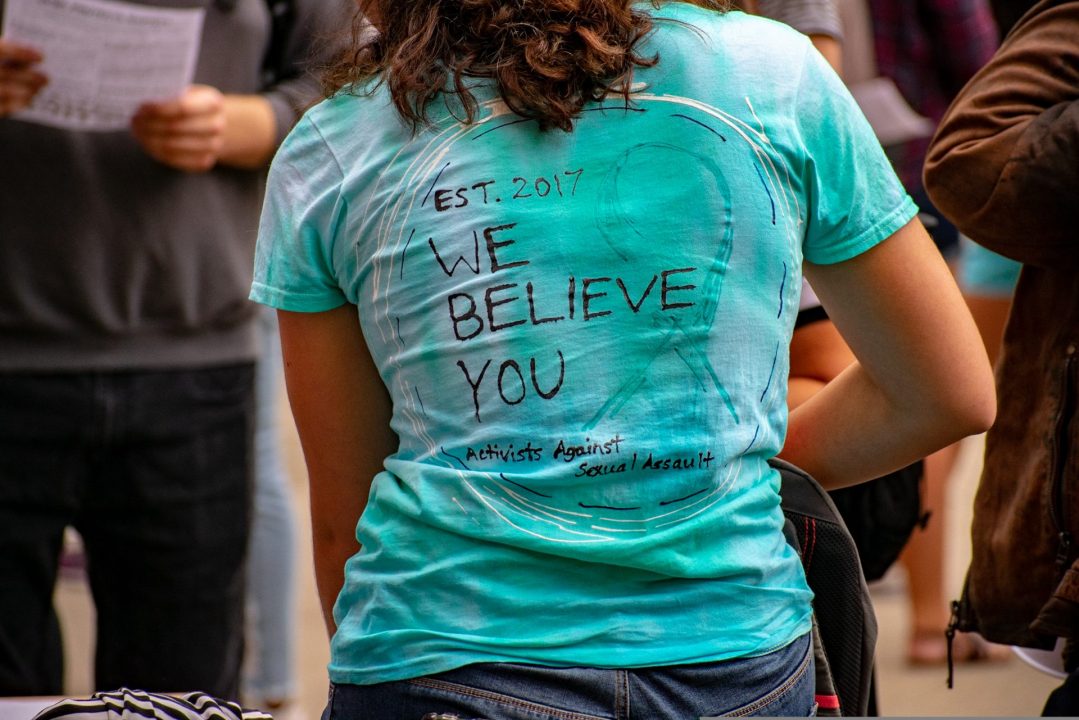Sexual assault has been a hot-button issue across campus lately, with an ongoing court case against the University of Maryland, Baltimore County bringing the issue even closer to home. Two student organizations, We Believe You and Speakout to Oppose Predators and Their Protectors, are working to spread awareness, enact change in how sexual assault cases are handled and minimize (if not eliminate) instances of this crime at the university.
Though there is general agreement that college-aged adults from 18-24 are at an increased vulnerability for sexual assault, statistics for sexual violence crime vary widely; this variation largely depends on the sample population and the exact definition of the misconduct. One commonly repeated figure for Americans is that over two in five women (44.6%) and one in five men (22.2%) experience sexual victimization other than rape, according to 2010 research by the National Intimate Partner and Sexual Violence Survey in partnership with the Centers for Disease Control and Prevention.
That same year, the Federal Bureau of Investigation recorded 85,593 rapes – over a million fewer than cited by the CDC – in part due to the FBI’s disregard for potentially consent-impairing factors (such as alcohol) within its definition of sexual crimes. However, a prevalence of false claims is often used as a scapegoat for number discrepancies, although this is believed to explain only approximately 7 percent of all known cases based on a U.S.-based study through the Making a Difference Project. In fact, an estimated 65 percent (according to a study done by the Bureau of Justice Statistics in 2002) of legitimate cases are believed to go unreported.
This statistic is a primary reason that the groups at UMBC elect to prioritize trust in any alleged victim in order to encourage others to come forward. We Believe You describes itself as “a survivor-centered, student activist organization that aims to end sexual violence on campus,” in a statement recently submitted to The Retriever and published below. Since its founding a year and a half ago, they have put pressure on the school to ensure all students and faculty members undergo sexual assault handling classes and reached out to an external consultant for best-practice next steps. Currently, no members have been reachable for or willing to provide further comment.
Being a group as well as a movement, STOPP has a Facebook page with membership in the hundreds at only a few months old. They are perhaps best-recognized as the organizers of the large protest that took place on campus earlier this semester, and they meet every Friday to plan similar events in reaction to the ongoing allegations of sexual assault cases being mishandled by UMBC.
Exact occurrence rates aside, the effects of random and domestic sexual violence can be severe, with lasting impacts including anything from unwanted pregnancy, to cervical cancer, sexually transmitted infections and perhaps worst of all, post-traumatic stress disorder. Sexual assault can be perpetrated by a friend, a family member, or a partner — in the same vein, anyone could be a survivor of sexual abuse unbeknownst to those he or she knows.
Compassion and respect are paramount in helping survivors of sexual assault; this, as well as justice and increased visibility for victims, is the goal of groups like STOPP and We Believe You. Reform is underway, and conversations are happening.
The following statement was written for The Retriever by We Believe You:
We Believe You is a survivor-centered, student activist organization that aims to end sexual violence on campus. At a little over a year old, we have collaborated with students, staff, and faculty in efforts to make campus safer and keep survivors centered in all conversations about needed changes to our campus. The allegations in the lawsuit against UMBC officials are deeply concerning and we share the multi-faceted and complex emotions that many students, faculty, and staff are feeling right now. These feelings are completely valid and provides even more urgency to why we are working harder than ever to get the change we all deserve. We encourage people in our UMBC community to not lose hope during this time as we put in the work to right wrongs and make UMBC a safer place. Culture change takes time and requires sustainability. We Believe You is dedicated for the long work ahead. We hope we can rely on others to do the same. Our general body meetings are open to all students wishing to make a difference on campus and prioritize survivor support and healing. We invite you to join us as we cultivate this brave space for survivors and allies.
The UMBC administration has guaranteed that everyone attending and working for the university will be required to attend specialized and detailed, in-person training on sexual violence prevention and response. This has been a major goal of our organization since our inception, but change won’t stop there. While we are waiting to hear the recommended changes from the external consultant, we will continue to work on making resources more accessible to everyone, improving police presence and their role on campus, bringing students concerns about the Title IX office to the administration, making sure perpetrators are stopped and held accountable for their actions, and above all, fostering a space where survivors can be heard and helped.
To survivors of sexual violence – especially our UMBC peers: We see you. We hear you. We believe you.
Correction: a previous version of this article stated that one in five women and one in 71 men are sexually victimized. However, this is a misrepresentation of the 2010 study done by National Intimate Partner and Sexual Violence Survey and Centers for Disease Control and Prevention, which states that these statistics apply to women and men who have been raped. Furthermore, the statistic that 65 percent of rapes go unreported was attributed to “Rennison, 2002;” this referred to a Bureau of Justice Statistics report done by statistician Callie Rennison, PhD. Updated 11/15 at 10:05 P.M.

